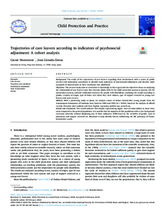Abstract:
Background:
The study of the trajectories of care leavers regarding their involvement with a series of public services and institutions contributes to identify some indicators of psychosocial adjustment and therefore make proposals of improvement in their transitions into adulthood.
Objectives:
The present study aims to contribute to knowledge in this regard and the objectives focus on analysing the relationship of care leavers once they become adults with (i) the child protection system as parents, (ii) the penitentiary system, and (iii) residential resources for people with disabilities, analysing the results according to gender, country of origin, type of foster care when they were minors, type of support received as young care leavers and years in care.
Method:
With a pioneering study in Spain, the authors analyse cohort of former looked-after young people from the Autonomous Community of Catalonia born between 1983 and 1993 (N ¼ 8334), based on the analysis of official records. Bivariate data analysis and three logistic regression models was carried out.
Results and Conclusions:
The results indicate that despite experiencing higher rates of vulnerability in these three areas compared to the general population, it is notable that the majority of this population with a care background overcome adversity without displaying any of these indicators. Differences by the variables of gender, type of placement and supp

